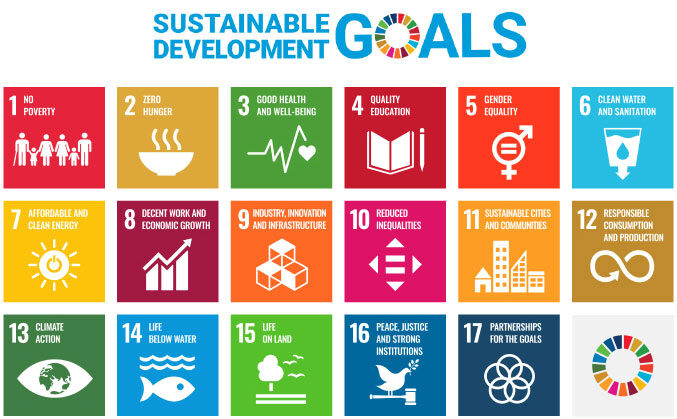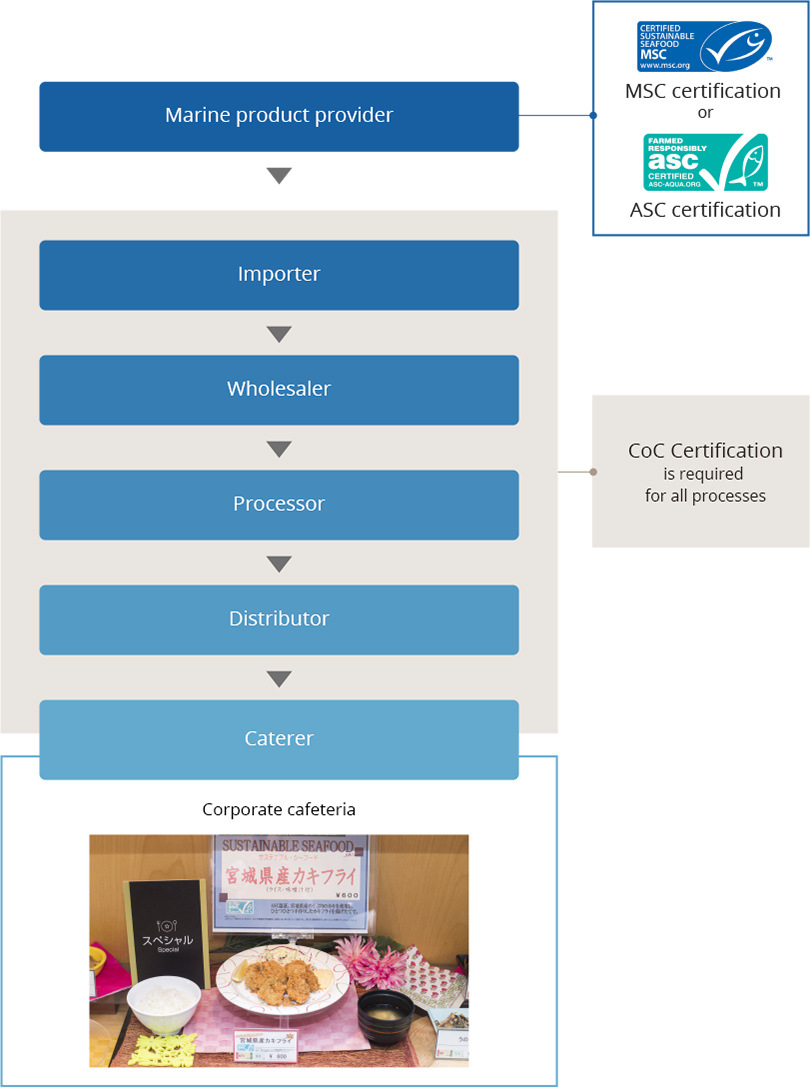
Sustainable Seafood Project Places the Environment Front and Center
Panasonic corporate cafeterias feature fish farmed with sustainability in mind
Marine resources are under threat of depletion due to the world’s rising population. Panasonic’s corporate cafeterias are being used as a stage to enlighten people in a variety of ways, including the incorporation of “sustainable seafood”—seafood produced using sustainable practices—into their menus, which is also intended to contribute to the achievement of Goal 14 (Life Below Water) of the UN’s Sustainable Development Goals (SDGs).
17 Sustainable Development Goals (SDGs)
Over-fishing and aquaculture contribute to the continuous increase in the consumption of aquatic resources. If countermeasures are not undertaken, future generations may be unable to enjoy fish and shellfish. In order to preserve these gifts of the oceans and rivers for those who come after us, Panasonic has been introducing, since March 2018, sustainable seafood items into the menus at its corporate cafeterias. This initiative is the first of its kind for a company headquartered in Japan.
Sustainable seafood refers to marine products for which the producers in the fishery and aquaculture industries have used sustainable methods of production, giving consideration to resource management, the environment, and society. As of January 2020, sustainable seafood has been incorporated into menus at 30 corporate cafeterias, and Panasonic aims to complete its introduction at all of the 100 or so cafeterias that serve its workforce of over 100,000 people in Japan before the end of fiscal 2020.

Sustainable development goals
- No poverty
- Zero hunger
- Good health and well-being
- Quality education
- Gender equality
- Clean water and sanitation
- Affordable and clean energy
- Decent work and economic growth
- Industry, innovation and infrastructure
- Reduced inequalities
- Sustainable cities and communities
- Responsible consumption and production
- Climate action
- Life below water
- Life on land
- Peace, justice and strong institutions
- Partnerships for the goals
Certifying sustainable seafood for consumption
One initiative for protecting marine resources that is being promoted worldwide is the process of selecting sustainable seafood. The Marine Stewardship Council (MSC) and Aquaculture Stewardship Council (ASC) have been established as systems for certification. If consumers begin to choose marine products bearing the label of certification under one of these systems, the number of fishing industry operators looking to acquire certification will increase. This will lead to the protection of the rich bounty of the seas.

Flow for provision of certified marine products
Panasonic faced daunting obstacles in its introduction of sustainable seafood. To be able to state that its corporate cafeteria menu offerings use sustainable seafood, all companies involved—not just marine product providers, but importers, wholesalers, processors, distributors, and caterers—must be compliant, across the breadth of the supply chain. The Chain of Custody (CoC) guarantees that traceability is secured, requiring that these companies satisfy a wide range of conditions in order to acquire certification.

Chain of custody flow outline
- MSC Certification or ASC Certification
- Marine Product Provider
- CoC Certification (required for all following processes)
- Importer
- Wholesaler
- Processor
- Distributor
- Caterer, Corporate cafeteria
To maximize the impact of this initiative, Panasonic is accelerating its efforts outside of the company. The company is actively providing support to other companies, encouraging them to introduce sustainable seafood into their corporate cafeterias to dramatically expand recognition of this product. It is also providing support for the acquisition of CoC certification to members of the catering industry.
Panasonic hopes, through awareness raising activities, to inspire a major change in consumer behavior. A basic idea is for its employees to sample and appreciate sustainable seafood, and tell others about it. And, through the continued advancement of this and like initiatives, the company intends to contribute to the preservation of marine resources and to the realization of a sustainable society.
Related links
Conserve Marine Environment through Its Corporate Cafeterias - Panasonic's Challenge to Propagating Sustainable Seafood [Global Site]
Protect Marine Life with Corporate Cafeterias - Sustainable Seafood Initiatives [Global Site]
Environment: Biodiversity Conservation [Global Site]
Sustainability [Global Site]




